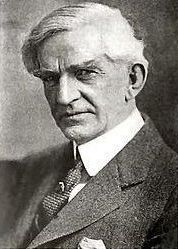Frank Bacon (Frank Bacon)

Actor, Playwright. He is remembered for his work in early silent films and stage in the twilight of his career, after years of relative obscurity. He possessed a laconic, casual style of underplaying that was unusual and connected with audiences. Born on a farm near Yuba City, California, his parents had moved from Kentucky and married in nearby Prairie City, California. He grew up in San Jose, California where he attended school before dropping out in his early teens to work at a nearby sheep ranch. Around the age of 17, he became a photographer’s apprentice and with a brother would eventually open his own photography studio in San Jose. After several years he abandoned photography for newspaper work and became an advertising agent for the San Jose Mercury. A few years later he purchased The Napa Reporter and not long afterwards founded The Mountain View Register. He attempted politics which failed and, growing weary of the newspaper business, he joined a San Jose stock company. By 1894 he was a member of a drama company with D. K. Higgins and Georgia Waldron playing the villain in Higgins’ melodrama, “The Plunger.” He later formed a small company with his wife and a few other actors and toured mostly California venues for a number of seasons. He was a member of the repertoire company at the Alcazar Theatre for many years and only left after the theatre fell victim to the 1906 San Francisco Earthquake. Afterwards, he become a popular comedian at Oakland’s Ye Liberty Playhouse and toured with theatrical and vaudeville companies. In December 1912 he made his Broadway debut at the Gaiety Theatre, playing ‘Papa Carr’ in Carlyle Moore’s long running comedy, “Stop Thief.” In late 1914, he played ‘Hiram Higgins’ at the Astor Theatre in George M. Cohan’s “The Miracle Man” and, over the first seven months of 1916, he scored a hit at the Hudson Theatre as ‘Jerry Primrose’ in “The Shebear’s Servant,” as well as in the Edward Childs Carpenter drama, “The Cinderella Man.” Between 1915 and 1916 he appeared in four silent films, “The Silent Voice” (1915, from the play by Jules Eckert Goodman), “Rosemary” (from a play by Lois N. Parker and Murray Carson), “Her Debt of Honor” (from a scenario by William Nigh), and “A Corner in Cotton” (1916, from a story by Anita Loos). In August 1916 he debuted at the Gaiety Theatre in “Lightnin’,” a comedy that he had worked on for a number of years. The play, originally titled “A House Divided,” is about ‘Lightnin’ Bill Jones’, a “lovable old liar” not known for his swiftness of foot. The play was first produced as one-act plays in tours following the San Francisco Earthquake. The play was revised a number of times, the last with the help of writer Winchell Smith. Bacon has sold the film rights to his play; Smith, seeing the potential in the concept, advised Bacon to buy the rights back. The two had become partners after Smith saw him perform in “The Cinderella Man” and proposed they work together on some future project. He suggested “A House Divided” and Smith agreed, and soon what began as a two week rewrite grew to take in the better part of two years. The resulting play ran on Broadway for three years, almost twice as long as any production to that point, setting a Broadway record for the day of 1,291 performances and was still going strong on tour after more than 700 shows when he was forced to bow out due to fatigue. He died at the Hotel Del Prado in Chicago, Illinois at the age of 58, where he had gone after his final performance of “Lightnin’,” at the Blackstone Theatre. He was the father of Hollywood director Lloyd Bacon. (bio by: William Bjornstad)
Born
- January, 16, 1864
- USA
Died
- November, 11, 1922
- USA
Cemetery
- Oak Woods Cemetery
- Illinois
- USA

